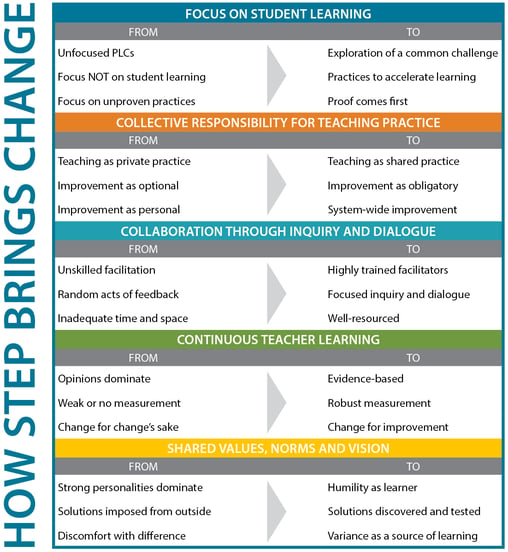
Since professional learning communities (PLCs) for teachers starting taking off in the 1990s, they have been full of promise but lacking in execution. They were grounded in the belief that participating in them would ultimately lead to improvement in teacher practice and increases in student achievement. Too often, though, we have seen that promise go unfulfilled.
While there is plenty of evidence to support the fact that teachers and administrators enjoy participating in PLCs, there is very little real data to show the impact of this participation on teacher and student growth. School leaders find themselves continuing to struggle with how to structure meaningful opportunities for teachers to work together.
Introducing the Supporting Teacher Effectiveness Program
In 2013, the Bill and Melinda Gates Foundation invited Long Beach Unified School District, the American Institutes for Research, Kitamba, and my company, Insight Education Group, to work together to find solutions to the pressing problems that PLCs have been wrestling with since the 1990s:
- How do we close persistent achievement gaps in order to ensure that all students are achieving at high levels?
- How do we help prepare students for college and career success when the odds are stacked against them?
- How do teachers get better when they are already doing everything they can to help their students succeed?
Out of that partnership, the Supporting Teachers Effectiveness Program (STEP) was born. STEP is a nimble, action-oriented PLC framework and set of protocols to help teachers find, share, and test positive deviant practices with their peers to bring improvement—and then replicate them.
As I discussed in more detail in a recent Language Magazine article, positive deviance is an asset-based, problem-solving, and community-driven approach that enables the community to discover successful behaviors and strategies from within and develop a plan of action to promote their adoption by all concerned.
The Five Key Shifts
Through the development of the STEP framework, we codified five key shifts that happen in healthy PLCs and that lead to meaningful and lasting improvement.

- Focus on student learning.
Many traditional PLCs focus on unproven practices and challenges teachers themselves are facing without focusing on what’s most important: student learning.
As the Carnegie Foundation for the Advancement of Teaching has demonstrated in the characteristics of networked improvement communities, PLCs must be focused on a well-specified common aim to accelerate student learning through disciplined methods of improvement research to develop, test, and refine interventions. - Create a collective responsibility for teaching practice.
In a healthy PLC, teaching is no longer about keeping practice private but rather about making teaching a shared, collaborative practice. Participants embrace the discipline of improvement research in order to solve challenges that will benefit the entire system, rather than only their own individual classrooms. - Collaborate through inquiry and dialogue.
Healthy PLCs are grounded in effective facilitation by highly-trained teacher leaders or instructional coaches. Practical and no-nonsense facilitation methods help participants navigate the methods of improvement research in their work. At the same time, effective facilitators create time and a safe space where teams feel empowered to engage, innovate, try new approaches, learn, and grow. - Focus on continuous teacher learning.
Instead of allowing the opinions of one or two participants to dominate, participants in healthy PLCs take time to examine potential proof points, including carefully reviewing the evidence and conducting robust measurement—all with the goal of bringing about real improvement that impacts student learning. - Ensure shared values, norms, and vision among participants.
In healthy PLCs, participants exhibit humility, vulnerability, and teachability that leads to effective—and sometimes incredible— solutions being found from within their group. Participants are comfortable with differences of opinion within the group and, in fact, view differences as a source of learning.
Teachers Must Drive This Work
I know from research, experience as an educator myself, and work with educators across hundreds of districts that teachers must drive the work of improvement.
However, this can only happen through a process of ground up change management—and the top-down conditions that support it. Effective school leaders must provide the time and resources to proactively address problems of practice and develop solutions that will ultimately change outcomes for students.
Ben Jenson and his co-authors confirm this sentiment in the report Beyond PD: Teacher Professional Learning in High Performing Systems:
“Teachers who assume roles of professional learning leaders in schools have a greater impact on teaching and learning. Teachers are more likely to change their practices when they see colleagues they admire—not just official leaders—championing desired improvements.”
I encourage you to take some time to look closely at how well your PLCs are working in light of the five shifts above.
A post shared by Insight Education Group (@insightedgroup) on
If you’d like to learn more about STEP and how it might support your PLC priorities, download a sample from the STEP Playbook, including the introduction and chapter 1.
